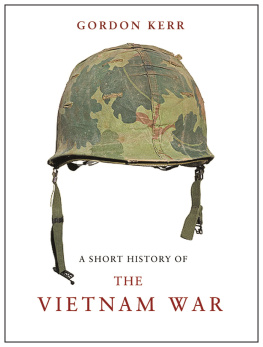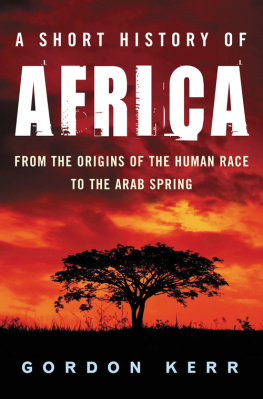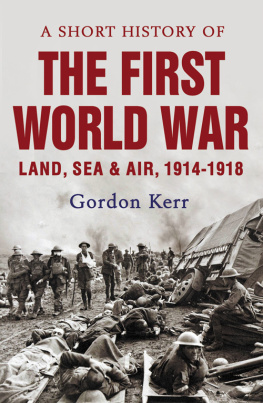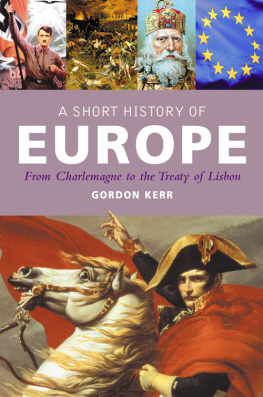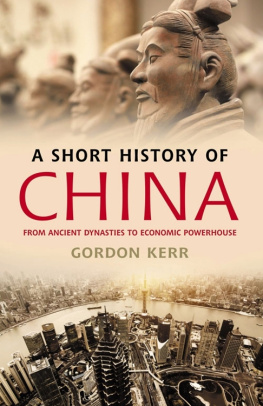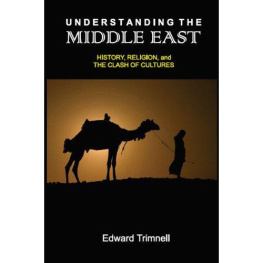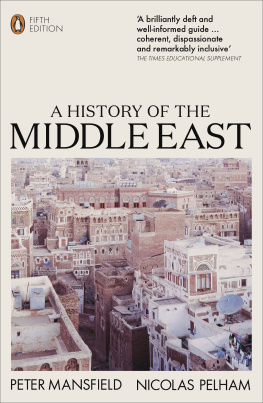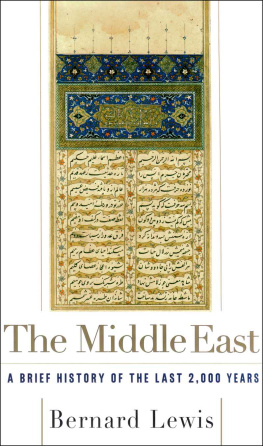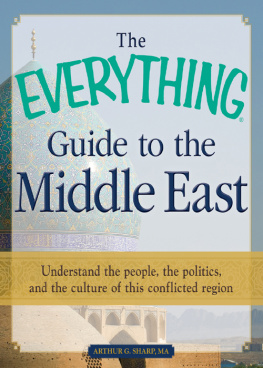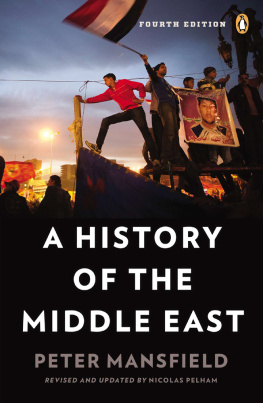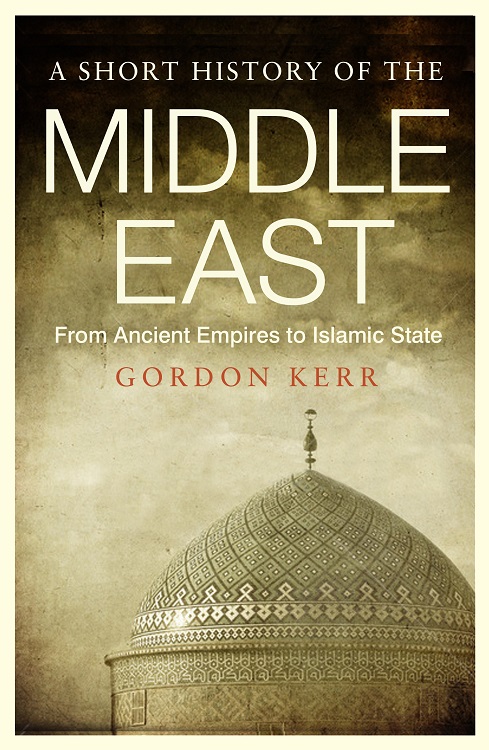A SHORT HISTORY OF THE MIDDLE EAST
Situated at the crossroads of three continents, the Middle East has confounded the ambition of conquerors and peacemakers alike. Christianity, Judaism and Islam all had their genesis in the region but with them came not just civilisation and religion but also some of the great struggles of history.
A Short History of the Middle East makes sense of the shifting sands of Middle Eastern history, beginning with the early cultures of the area and moving on to the Roman and Persian Empires; the growth of Christianity; the rise of Islam; the invasions from the east; Genghis Khans Mongol hordes; the Ottoman Turks and the rise of radicalism in the modern world symbolised by Islamic State.
About the author
Gordon Kerr worked in bookselling and publishing before becoming a full-time writer. He is the author of several titles including A Short History of Europe , A Short History of Africa , A Short History of China , A Short History of Brazil , A Short History of the First World War and A Short History of the Vietnam War . He divides his time between Dorset and South West France.
informative, fascinating and extremely well-researched...Gordon Kerrs book is a mini masterpiece Rob Minshull, ABC Brisbane
Borders are the scars of history
Robert Schuman, French statesman
Introduction
The Middle East describes a huge arc that encompasses Turkey, Iran, Syria, Iraq, Jordan, Israel, the Palestinian Territories, the Arabian Peninsula and Egypt. In fact, as a descriptive for this most ancient of regions the term Middle East is of fairly recent coinage. Before the First World War, people were more likely to use the words the Near East to describe the area that comprises Turkey, the Balkans, and the Levant (roughly the eastern Mediterranean Cyprus, Israel, Jordan, Lebanon, Palestine, Syria and the Hatay Province of Turkey). When the term Middle East was used at that time, it referred to Arabia, the Gulf, Persia, Mesopotamia and Afghanistan. This usage changed, however, with the defeat of the Ottoman Empire in the First World War which gave the Allies control of the empires former Arab conquests. The term Middle East gradually began to encompass both regions. The Second World War increased this usage, particularly as the entire region was treated as one strategic theatre of war by the Allies.
It is a term that is entirely Eurocentric, of course, and to people of the Indian sub-continent, for example, the region is really the Middle West. But, the West is now dominant in world affairs and is able, therefore, to look upon the world as if it were its own. It was not always thus, however. Only in the last five centuries have the nations of Europe and the West ruled the roost. For the four and a half millennia prior to that the period of recorded human history it was not the West, but the Middle East that took centre stage and played a leading role in the advancement of humankind.
So much of human history was created in the region now known as the Middle East, developments that have led to our own modern civilisation. One of the earliest surviving codes of law was compiled by the king of Babylon, Hammurabi (r. c. 1792-50). Akhenaten, a pharaoh of ancient Egypts Eighteenth Dynasty abandoned polytheism for the monotheistic worship of Aten, thereby inventing the notion of the single, all-powerful deity. The oldest inhabited towns on earth, ancient settlements such as Jericho and Byblos, can be found there and the great religions of Islam, Judaism and Christianity have their roots there.
The Middle East has played a huge part in history and still does to this day. Its empires occasionally stretched into Europe. For instance, the Moors of the Umayyad Caliphate captured almost all of the Iberian Peninsula in the eighth century and Muslims controlled that part of the world until the thirteenth. The Ottoman Empire between the fourteenth and the seventeenth centuries extended its territory not only in the Middle East but also almost as far as Vienna. And, of course, there was European involvement in the Middle East before those times, with Byzantine and Roman possessions and cultural influence in the region.
After relative calm and stability under the Ottomans for a number of centuries, the twentieth century brought turmoil to the Middle East with interference from France and Great Britain who had their own imperialist agendas and with age-old religious and ethnic rivalries rising to the surface. We are still experiencing the fall-out from these and it appears that the situation is unlikely to change in the near future.
It is almost impossible to write a short history of this complex region with its web of rivalries and suspicions, but hopefully A Short History of the Middle East will go some way towards unravelling these complexities and explaining how we arrived at the fragile situation of today.
Ancient Civilisations
The Middle East occupies a unique position in the history of humankind. It was probably in that area that, around 8,000 years ago, we first began to cultivate food crops and domesticate certain animals after perhaps a million years of subsisting on wild vegetables and hunting. It was this development, the result of a great deal of trial and error, that led to the advancement of human civilisation. Soon, great civilisations were appearing that would wax and wane throughout history up to the present day. They overlapped and interacted, often going to war with one another, their peoples merging and interbreeding through the centuries.
The first evidence of people becoming sedentary and beginning to establish urban centres has been found in the Mesopotamian Basin. This area, the name of which means land between rivers (the Tigris and Euphrates), is home to many of the worlds oldest major societies and is often described as the cradle of civilisation. The first cities in history developed here during the Chalcolithic period of the Bronze Age from round about 5300 BC.
The Sumer and the Akkadian Empire
(c. 5300-1700 BC)
First signs of the Sumerian civilisation, one of earths oldest, can be dated back to roughly 5000 BC. The Sumerians are believed to have migrated to Mesopotamia from the areas of modern-day Turkey and Iran although there is no real certainty about this. One and a half thousand years later they had built cities in the Fertile Crescent, the area between the Tigris and Euphrates that provided the means to live in what was essentially a desert. Sumer became divided into a dozen or so independent city states each of which surrounded a temple dedicated to a god or goddess. The earliest city in Mesopotamia and, therefore, the oldest city in the world, is said to be Eridu in southern Mesopotamia. Four other cities were built before, it is suggested, being wiped out by a great flood which may be no more than myth.
These first cities came under the control of the Akkadian Empire between the twenty-fourth and twenty-second centuries BC. This empire was founded by Sargon the Great (r. c. 2334 BC-2279 BC) who led his forces in the conquest of the Sumerian city-states. Sargons empire grew to incorporate not just large parts of Mesopotamia, but also parts of present-day Iran, Asia Minor and Syria. It was amongst the first multi-ethnic, centrally ruled empires in history.
The Akkadian language became the lingua franca of the Middle East, used in government and administration while the Sumerian language remained in everyday use and in literature. Even when Sumer was no longer a great power, its language continued to be used in schools in the later civilisations of Babylonia and Assyria, in the same way Latin would later be used in mediaeval Europe. As well as being the inventors of bureaucracy, the Sumerians were amongst the first people to use the wheel. There is evidence that wheeled vehicles were being used from the second half of the fourth millennium BC in Mesopotamia.


